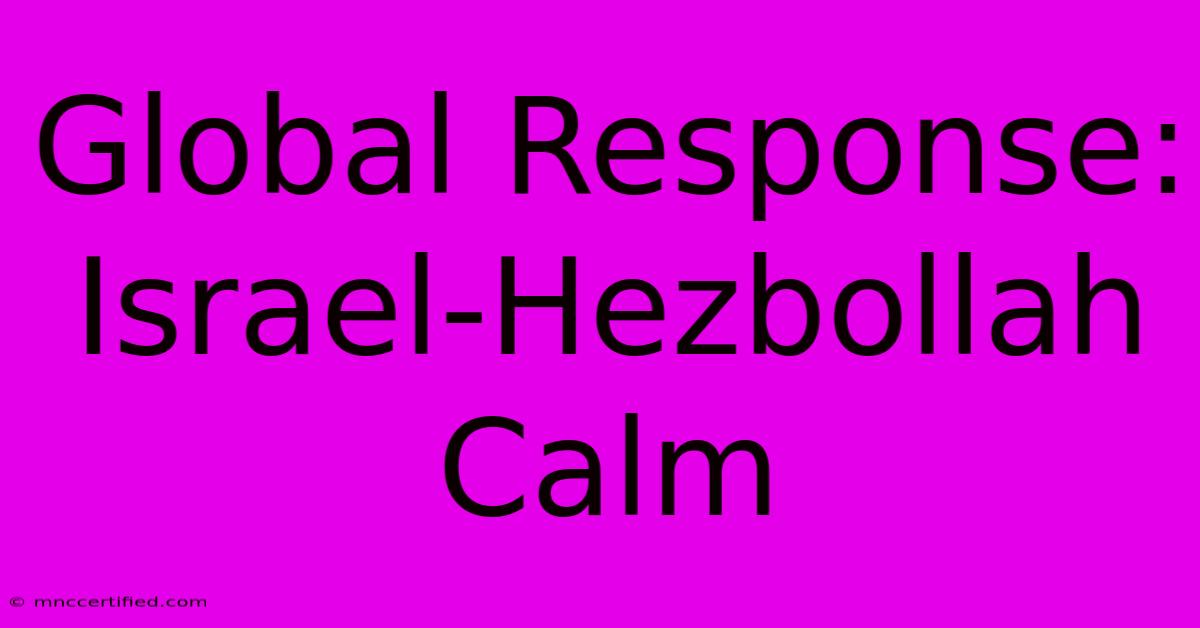Global Response: Israel-Hezbollah Calm

Table of Contents
Global Response: Israel-Hezbollah Calm – A Delicate Peace
The recent period of relative calm between Israel and Hezbollah has sparked a complex and multifaceted global response. While the cessation of hostilities is welcomed by many, the underlying tensions and potential for future escalation remain a significant concern for international actors. This fragile peace necessitates a careful examination of the current situation, the contributing factors, and the diverse perspectives shaping the global reaction.
Understanding the Current Calm
The current calm, while seemingly precarious, follows a period of heightened tensions. Several factors contributed to the de-escalation, including, but not limited to:
-
Deterrence: Israel's robust military capabilities and past actions have played a significant role in deterring further Hezbollah aggression. Their capacity for swift and decisive retaliation serves as a powerful deterrent.
-
Regional Dynamics: The complex web of regional alliances and rivalries, including the involvement of Iran and other actors, influences the calculations of both Hezbollah and Israel. A major conflict could disrupt existing power dynamics.
-
International Pressure: Significant international pressure, particularly from the United States and the United Nations, has urged restraint on both sides. The potential for wider regional conflict significantly increases the stakes of intervention.
-
Internal Factors within Lebanon: Lebanon's ongoing economic and political crises may have contributed to a reluctance within Hezbollah to escalate the conflict at this time.
Diverse Global Reactions: A Spectrum of Responses
The global community's response to the calm is far from monolithic. Different nations and international organizations hold diverse perspectives and priorities, resulting in a spectrum of reactions:
The United States: A Cautious Optimism
The US has expressed cautious optimism while maintaining a strong commitment to Israel's security. The administration continues to monitor the situation closely and reiterate its support for Israel's right to self-defense. However, they also acknowledge the need for regional stability and are likely working behind the scenes to prevent future escalations.
The United Nations: Calls for Restraint and Dialogue
The UN has consistently called for restraint from both sides and emphasized the importance of diplomatic solutions. They play a crucial role in humanitarian aid and peacekeeping efforts within the region and are actively engaged in promoting dialogue between the conflicting parties.
European Union: Balancing Security Concerns and Humanitarian Aid
The EU, while prioritizing the security of its citizens and interests, also focuses on providing humanitarian aid to Lebanon and supporting efforts to stabilize the region. Their stance often involves a delicate balancing act between maintaining strong ties with Israel and engaging with the complex political landscape of Lebanon.
Regional Actors: A Complex Web of Alliances and Interests
The response from regional actors is far more nuanced and often reflects their existing political alliances and interests. Some nations may publicly support one side while engaging in quiet diplomacy with the other, reflecting the intricate and often contradictory nature of regional politics. This makes understanding the complete picture challenging.
The Future: Maintaining the Calm and Preventing Future Escalation
Maintaining the current calm requires a multifaceted approach that addresses both the immediate security concerns and the underlying political and economic issues. This includes:
-
Continued Deterrence: Maintaining a strong military presence and credible deterrent remains crucial.
-
Diplomatic Engagement: Continued diplomatic efforts, facilitated by international actors, are necessary to address the root causes of conflict and promote dialogue.
-
Economic Assistance: Providing economic aid and support to Lebanon could help alleviate some of the underlying tensions that contribute to instability.
-
Addressing Underlying Issues: Long-term stability requires addressing the deeper political and economic issues that fuel conflict in the region.
The current calm between Israel and Hezbollah is a fragile peace. The international community's response, while diverse, emphasizes the need for sustained vigilance, diplomatic efforts, and a commitment to addressing the root causes of conflict to prevent future escalations. The path toward lasting peace remains long and challenging, requiring sustained engagement from all stakeholders.

Thank you for visiting our website wich cover about Global Response: Israel-Hezbollah Calm. We hope the information provided has been useful to you. Feel free to contact us if you have any questions or need further assistance. See you next time and dont miss to bookmark.
Featured Posts
-
Trump Taps Bhattacharya For Nih
Nov 28, 2024
-
Conall Storm Train Disruptions Weather Warning
Nov 28, 2024
-
Fa Reviewing David Cootes Actions
Nov 28, 2024
-
Florida Store Hours Publix Walmart Cvs
Nov 28, 2024
-
Lana Del Rey 2025 Tour Dates Tickets Prices
Nov 28, 2024